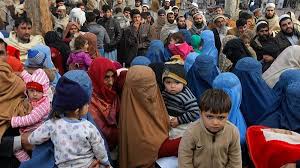UNHCR Statement: Afghanistan, Pakistan and Iran commit to new Afghan support platform at Refugee Forum

Islamabad: Forty years since the onset of the Afghan displacement crisis, leaders from the Islamic Republics of Afghanistan, Iran, and Pakistan along with UNHCR and refugee representatives have gathered in Geneva to launch a new Support Platform for the Solutions Strategy for Afghan Refugees (SSAR) on the margins of the inaugural Global Refugee Forum.
Since the Soviet invasion of Afghanistan in December 1979, recurring violence has given rise to the displacement of generations of Afghans. Today, there are some 2.7 million registered Afghan refugees globally, with the vast majority generously hosted by the Islamic Republics of Iran and Pakistan, in addition to some 2 million internally uprooted in Afghanistan.
Despite decades of displacement, the Islamic Republics of Iran and Pakistan have provided support and assistance to approximately 950,000 and 1.4 million registered refugees respectively, including access to education and healthcare equivalent to that available to their own populations.
The support platform launched this week reinforces the efforts made by countries across the region towards lasting solutions. It will enhance coordination and help to ensure that humanitarian and development investments are closely aligned in the interests of refugees and local hosting communities. The platform also encourages a wider range of partners to commit themselves to contribute to solutions for Afghan refugees, including new donors, development actors, community organizations and the business sector.
Together with Afghanistan, the governments and people of Pakistan and Iran are working to protect and find lasting solutions for Afghan refugees. These include allowing Afghans in both countries to work and study, supporting them to contribute to the countries hosting them in turn, as well as to prepare for their voluntary and sustainable return to their homeland.
Pakistan’s Federal Minister of States and Frontier Regions, Sahibzada Mehboob Sultan, noted Pakistan’s long-standing hospitality, compassion and inclusive policies aimed at building empowerment and resilience of Afghan refugees. He reiterated Pakistan’s continued commitment to voluntary repatriation and sustainable reintegration of Afghan refugees in their home country and emphasized the need for greater burden- and responsibility-sharing by the international community in support of these efforts.
Monday’s launch included the release of a joint communiqué from all three countries reiterating their commitments to the SSAR as the principal framework for a comprehensive response and lasting solutions for displaced Afghans and those generously hosting them, as well as welcoming a more equitable approach to international responsibility and burden-sharing.
Iran’s Deputy Foreign Minister Gholam Hossein Dehghani said he hoped the platform would encourage investments in workable and practical approaches to the Afghan refugee situation. “The SSAR support platform is a test case for the Global Compact on Refugees, as now it is high time for the international community to bring a balance and shoulder its responsibility, as Iran has been doing a lot,” he added.
Dr. Alema Alema, Afghanistan’s Deputy Minister for Refugees and Repatriation, expressed her appreciation for Pakistan and Iran for hosting Afghans for 40 years, and called on development and humanitarian actors to play their role and invest in Afghanistan.
“After the success of the peace process, we have in place a comprehensive plan for the dignified return and sustainable reintegration of Afghans in Afghanistan,” she said.





